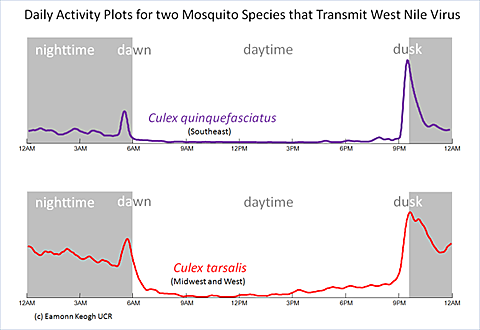The Wireless Bug-Sensor team at the University of California, Riverside (2012 first place Wireless Innovation Project Winners) have made an interesting offshoot finding related to the insect sensors they have developed with funding from the Vodafone Americas Foundation. This year’s West Nile virus season in North America is predicted to be particularly bad, with 3,124 cases and 134 deaths reported as of Sept 18, 2012. There is a plethora of unproven methods to combat West Nile disease: rubbing yourself in Vicks VapoRub, keeping a fabric softener sheet in your pocket, or avoiding (or eating lots of) bananas.

Dr. Eamonn Keogh, leader of the Bug-Sensor team, notes “We are taking insect observation to a level not seen before. Using sensors to detect insect flight, we have monitored several mosquito species that carry West Nile for their entire lifespan, 24 hours a day, seven days a week, 365 days a year.”
The location of each mosquito every second is converted into a data point that is transmitted to a central computer. In less than a year, the team has accumulated tens of millions of data points and is adding millions per month. In contrast, most past studies have been based on merely dozens of data points.
The UCR team has concluded that if you are outdoors an hour before sunset and an hour after sunset, the likelihood of a mosquito bite is 200 times greater than if you were outdoors during lunchtime. The Wireless Bug-Sensors, which were developed to assist farmers with insect intervention, can now also play an important role in improving people’s health. For more detailed information, please visit http://www.cs.ucr.edu/~eamonn/CE/WestNile.